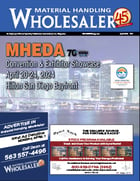
Does aggressive marketing increase parts/service sales and profits?
Over the years, we have discovered a single significant factor that differentiates a successful equipment dealer from an average equipment dealer. The successful dealer is proactive while the average dealer has a tendency to be reactive. This is particularly true regarding his aftermarket and/or product support. Aggressive and proactive, proactive and aggressive! Have you ever met a highly successful equipment salesperson who is not both aggressive and proactive?
We all like to comment that everyone in our dealership is a salesperson. In a typical equipment dealership the largest number of personnel is in parts and service. Therefore, in order to be successful, all of your personnel should be aggressive and proactive; including your counter personnel and technicians.
Every book or manual ever written about the professional art of selling clearly points out that there are six important steps to making a sale. We will discuss two of those steps in this article and both steps require your personnel to be both aggressive and proactive. The two important steps are: obtaining a commitment from the customer, asking for the order and selling the customer everything he needs, adding to the sale.
At one time or another we have all gone into a McDonalds. When we reach the head of the line someone with a smile on their face will say: “Good afternoon, welcome to McDonalds. May we have your order?” You will place your order for a hamburger and a milk shake. Again with a smile the counter person will say: “Would you like fries with your hamburger and shake?”
We have had dealer personnel tell us that this aggressive scenario is offensive. Granted, this form of selling may be offensive to a few customers, but does McDonalds really care? We all know that even though Burger King is gaining on them, McDonalds is still selling more fries than anyone else in the whole world. They can afford to have a few people object to their “so called” aggressive techniques. McDonalds has learned the important principal of related or suggestive selling to increase both their sales and profits.
There is probably no other combined department within an equipment dealership that has the opportunity to achieve more through aggressive selling techniques than the dealer’s aftermarket. No other department talks to more customers or has more customer exposure than the parts and service department personnel. No other department has more opportunity to ask for the business or to ask for more of the business than the parts and service departments.
Professionally aggressive or related/suggestive selling is using customers’ desires to own the benefits of your dealership’s parts and service, blended with your sincere desire to serve in helping customers make decisions that are truly beneficial for them.
Successful related/suggestive selling can take place in numerous operational areas throughout your dealership: in your parts department, over the phone or at the front counter, in your service department over the phone, in the shop or out in the field by your road technicians. Another excellent opportunity for aggressive, related/suggestive selling techniques is through your field customer service sales representative.
Product support merchandising requires an aggressive outlook toward sales. This means selling and not just filling orders! One of the buying trends that continually grow stronger is customer self-assistance. Customers, more than ever before, are purchasing from dealerships that provide: availability, quality, excellent service and value-added assistance. These factors must not simply exist, they must be easily perceived by your customers. It should be your department’s goal to capitalize on this trend in fulfilling the buying needs of your customers.
Your dealership is in business to make a profit. Profit is what drives any business. It pays the bills and the salaries of the dealership’s employees. There is absolutely nothing wrong with aggressively asking for the business that your customers may be taking elsewhere. This is exactly what differentiates the marketer from the supplier.
An excellent philosophy for any equipment dealer in parts and service might be to:
- Sell the customer the parts he/she came for, but attempt to sell him/her larger quantities (a carton of filters rather than one filter.)
- Sell the customer your seasonal or special promotions.
- Sell related items for what the customer is requesting.
- Have these parts and accessories installed in your own shop.
Plus sales for both parts and service means plus profits and sales for your entire dealership. The sale of a part provides a profit. A good job of suggestive selling multiplies the sale and the profit. A sale of the parts and accessories plus installation of those parts and accessories provides additional profit through the dealer’s service department.
For those of you who may believe aggressive selling may irritate the customer, answer this question. If a customer drove ten miles to town to buy a water pump and your counter person neglected to mention the need for a gasket and the customer had to return to purchase the gasket, would the customer be irritated?
Remember related parts do not always mean adjacent parts. For example, a deteriorating hydraulic pump, prior to failure, may have carried a small amount of metallic particles into the oil system. These particles deposited in lines, valves, cylinders, etc. of the hydraulic system constituted secondary damage, and yet these parts were not adjacent to each other.
How many of you in service have heard a customer comment: “Why didn’t you take care of this problem while you were here?” or “While I had my unit in your shop for two days, why didn’t you fix the _____?” Is the customer irritated when he makes these statements? You bet he is! Could you have avoided these questions and allegations if you had aggressively suggested your desire to perform the additional work while the technician was on location or while the unit was in your shop?
Make no doubt about it, both your field technicians and your customer service sales representative can sell “a whole lot more” parts and service by aggressively marketing what your dealership has to offer.
Yes, effective training is required if dealers want their product support personnel to aggressively market what the dealership offers. The competent product support personnel (department managers, counter personnel, shop and field technicians) will know not only the products but also the selling features and benefits that set them apart from the competition.
Your dealership’s product support personnel will require customer knowledge. Nothing is more annoying to a long-time customer than to have to deal with someone who knows nothing about the customer’s needs and preferences. If it happens often, you can be sure that the customer is a ripe target for the competition.
An effective product support person must be a skilled listener and will have the question asking skills to find out what he needs to know to serve the customer well. Selling skills for the product support person involves finding solutions to customer’s problems while handling any customer objections that may stand in the way.
Effective product support personnel have the skills to adapt their strategies and methods to the preferences of their customers. Nothing builds a loyal customer following quicker than making each one feel as if his account is the dealership’s most important account. Good customer service is much more than smiling and being friends; it is an entire set of professional skills in which top product support personnel excel.
Get started with a regular training program for all employees who serve your customers and watch both your sales and profits grow!
John R. Walker is president of Aftermarket Services Consulting Co. Inc. E-mail [email protected] to contact John.









